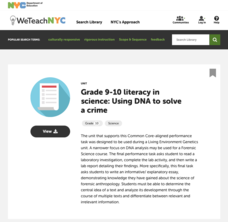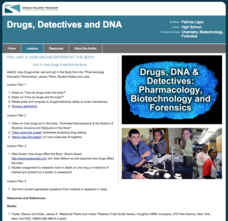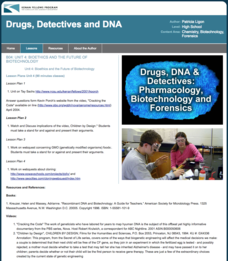Manitoba Education and Early Childhood Learning
Forensic Sciences: A Crime Scene Investigation Unit
Mr. Bergman has been murdered and we need you to solve the crime! The cross-curricular unit covers 11 different types of forensic science and includes 17 activities. Scholars perform blood type analysis, blood spatter analysis,...
Intel
Forensics: Get a Clue
Although the methods are all scientific, forensic science was started by police officers rather than scientists, who relied on observation and common sense. Young detectives use many tools to solve crimes around the school in a...
North Carolina State University
Exploring Genetics Across the Middle School Science and Math Curricula
Where is a geneticist's favorite place to swim? A gene pool. Young geneticists complete hands-on activities, experiments, and real-world problem solving throughout the unit. With extra focus on dominant and recessive genes, Punnett...
New York City Department of Education
Grade 9-10 Literacy in Science: Using DNA to Solve a Crime
Scholars become detectives and use science to solve a crime! A complete unit introduces DNA and includes hands-on activities that have learners model DNA and extract it from different food types. A culminating activity challenges...
Columbus City Schools
Thinking Like A Soil Scientist
Ready to roll up those sleeves and get your hands dirty? Dirty with soil science content, that is! Overcome those "But it's just dirt" objections with a trip outside to collect soil samples for some in-class analysis. Use the...
Kenan Fellows
Unit 3: How Drugs Enter/Exit the Body
The third of a four-part series on Pharmacology teaches scholars how drugs enter and exit the body, how they act inside the body, how they affect the brain, and more. Over the course of the unit, groups complete two labs and one...
Kenan Fellows
Unit 2: DNA Analysis
Ever wonder how they solve those mysterious murders in TV crime dramas? The second of four units in a Biotechnology series introduces scholars to the many methods of DNA analysis. Pupils create and run their own gel electrophoresis...
Kenan Fellows
Unit 4: Bioethics and the Future of Biotechnology
What's the future of biotechnology? Explore a hot topic in the fourth and final unit in a series of Biotechnology lessons. Learners develop an understanding of the many issues in bioethics, then create an argument for or against the role...
Kenan Fellows
Unit 4: The Brain
Drugs interact with the brain to alter moods, emotions, and behaviors by changing the brain's chemistry, perceptions, and interactions. The final lesson in the Pharmacology unit shows scholars experiments, has them complete four labs,...
ConnectED
Crime Scene Investigation
How exactly does a crime scene investigation work? The resource, a unit on criminology, covers everything from the deductive reasoning skills needed for detectives to DNA fingerprinting, all the way to how to gather evidence and bring...











